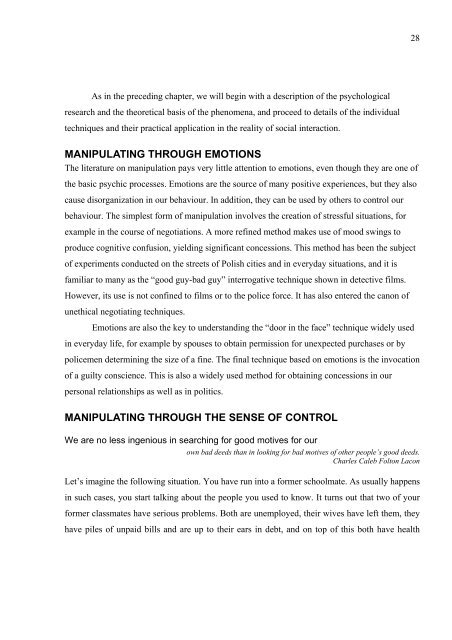PSYCHOMANIPULATION - Tomasz Witkowski
PSYCHOMANIPULATION - Tomasz Witkowski
PSYCHOMANIPULATION - Tomasz Witkowski
You also want an ePaper? Increase the reach of your titles
YUMPU automatically turns print PDFs into web optimized ePapers that Google loves.
As in the preceding chapter, we will begin with a description of the psychological<br />
research and the theoretical basis of the phenomena, and proceed to details of the individual<br />
techniques and their practical application in the reality of social interaction.<br />
MANIPULATING THROUGH EMOTIONS<br />
The literature on manipulation pays very little attention to emotions, even though they are one of<br />
the basic psychic processes. Emotions are the source of many positive experiences, but they also<br />
cause disorganization in our behaviour. In addition, they can be used by others to control our<br />
behaviour. The simplest form of manipulation involves the creation of stressful situations, for<br />
example in the course of negotiations. A more refined method makes use of mood swings to<br />
produce cognitive confusion, yielding significant concessions. This method has been the subject<br />
of experiments conducted on the streets of Polish cities and in everyday situations, and it is<br />
familiar to many as the “good guy-bad guy” interrogative technique shown in detective films.<br />
However, its use is not confined to films or to the police force. It has also entered the canon of<br />
unethical negotiating techniques.<br />
Emotions are also the key to understanding the “door in the face” technique widely used<br />
in everyday life, for example by spouses to obtain permission for unexpected purchases or by<br />
policemen determining the size of a fine. The final technique based on emotions is the invocation<br />
of a guilty conscience. This is also a widely used method for obtaining concessions in our<br />
personal relationships as well as in politics.<br />
MANIPULATING THROUGH THE SENSE OF CONTROL<br />
We are no less ingenious in searching for good motives for our<br />
28<br />
own bad deeds than in looking for bad motives of other people’s good deeds.<br />
Charles Caleb Folton Lacon<br />
Let’s imagine the following situation. You have run into a former schoolmate. As usually happens<br />
in such cases, you start talking about the people you used to know. It turns out that two of your<br />
former classmates have serious problems. Both are unemployed, their wives have left them, they<br />
have piles of unpaid bills and are up to their ears in debt, and on top of this both have health


